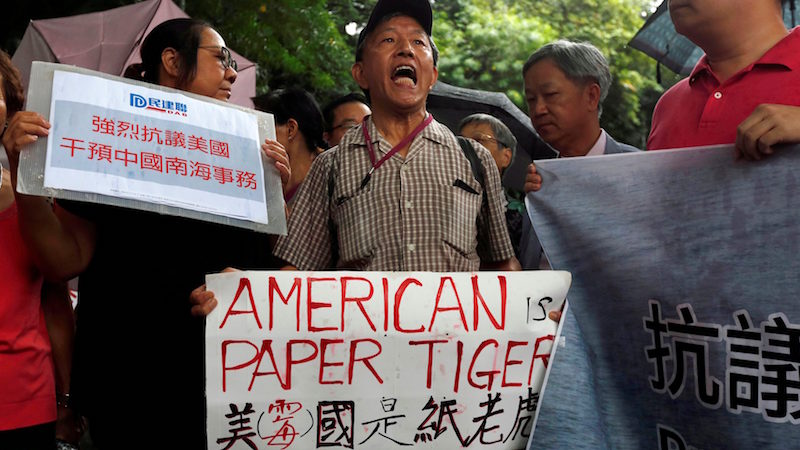Archive for Names
August 12, 2016 @ 2:08 pm· Filed by Victor Mair under Lost in translation, Names
Rachel Kronick has a knack for finding strange foreign equivalents for Chinese toponyms on Baidu, China's foremost online encyclopedia. See "The city of Mr. Andreessen, South Korea" (4/22/14).
Now she has struck paydirt again with "Mo Ri River Spengler" for Mòrìgélè hé 莫日格勒河 in the Baidu encyclopedia.
Read the rest of this entry »
Permalink
August 8, 2016 @ 2:09 pm· Filed by Victor Mair under Language and politics, Names, Transcription
Here is a photograph of some Chinese anti-American protesters from "The complete guide to China’s propaganda videos blaming the West for almost everything", by Zheping Huang, Quartz (8/8/16):

Read the rest of this entry »
Permalink
July 26, 2016 @ 11:27 pm· Filed by Victor Mair under Borrowing, Language and politics, Names, Topolects, Transcription, Writing systems
BBC News has a nice article by Tzu-Wei Liu on "The politics of a martial arts book fair in Hong Kong" (7/26/16). The article is accompanied by six photographs; I will focus on the two that interest me most (because they are both language related), the third and the sixth.
Here's the third photograph:

Read the rest of this entry »
Permalink
July 8, 2016 @ 10:41 pm· Filed by Victor Mair under Names, Peeving, Transcription, Writing, Writing systems
Xinjiang 新疆 (lit., "New Frontiers / Borders / Boundaries") is the northwesternmost and largest (one sixth of the whole country) among all of China's 34 provincial-level administrative units. It got its present official name in the 1880s under the Manchus during the Qing Dynasty (1644-1912), but it has also been called, among other names, "Western Regions", Eastern Turkestan, and Uyghurstan. When suitable, I prefer to refer to this region as Eastern Central Asia (ECA), since the latter designation is purely geographical in nature and has no political implications.
Read the rest of this entry »
Permalink
July 4, 2016 @ 5:58 pm· Filed by Victor Mair under Borrowing, Names, Transcription, Translation, Writing systems
That's what practically everybody else calls her too.
There's a great article by Qian Jinghua in Sixth Tone (Fresh voices from today's China) titled "Call Me Angelababy, Maybe: Ban on foreign names in Chinese-language press reveals fear of cultural fragility." (6/30/16)
It's about a phenomenally popular 27-year-old actress, model, and singer whose Chinese name is 楊穎, which is read as Yáng Yǐng in Modern Standard Mandarin (MSM) and Joeng4 Wing6 (conventional spelling Yeung Wing) in Cantonese. Her father, from Hong Kong, is half Chinese and half German, her mother is Shanghainese. Yang Ying's stage name, "Angelababy", by which virtually everyone knows her (most people are uncertain about her Chinese name or don't know it at all), comes from a combination of her English name "Angela" and her nickname "Baby".
So what's all the fuss over her name?
Read the rest of this entry »
Permalink
June 10, 2016 @ 12:58 pm· Filed by Geoffrey K. Pullum under Gender, Humor, Idioms, Jargon, Language and culture, Language and gender, Language and medicine, Metaphors, Names, Neologisms, Orality, Semantics, Silliness, Slang, Style and register, Swear words, Taboo vocabulary, Words words words
British comedian Richard Herring is the author of a 2003 book entitled Talking Cock: A Celebration of Man and his Manhood, so he naturally seized upon the republicization opportunity provided by the recent story of the world's first successful penis transplant. He made it the topic of his weekly humor column in The Metro, the trashy free newspaper that I sometimes reluctantly peruse in my constant search for linguistic developments that might be of interest to Language Log readers.
In a bravura display of diversity of lexical choice, Herring contrived to use a different euphemism for the anatomical organ every time he could find an excuse for mentioning it, which, believe me, was a lot. And he left me pondering a serious lexicographical question: just how many euphemisms are there for the appendage in question?
[Unusually, this post is restricted to adult males. Please click "Read the rest of this entry" to confirm that you are male and over 18.]
Read the rest of this entry »
Permalink
May 31, 2016 @ 10:17 pm· Filed by Victor Mair under Names, Transcription
Since I began writing blogs for Language Log around ten years ago, I have never received so many tips on what to write about as I have in response to the furor that has arisen over Nintendo's plan to change the Chinese names for some of the characters in their immensely popular Pokémon (ポケモン < Pokettomonsutā ポケットモンスター ["Pocket Monster"]) game series.
For example, much loved Pikachu (Pikachū ピカチュウ) was originally called Bei2kaat1ciu1 比卡超 in Hong Kong, which is very close to its Japanese name, Pikachu. But now Nintendo wants to get rid of Bei2kaat1ciu1 比卡超 and force the people of Hong Kong to use the Mandarin name Píkǎqiū 皮卡丘. This same policy extends to more than a hundred Pokemon characters, who will be renamed in accordance with Mandarin transcriptions. You can imagine how alien that will sound to Cantonese speakers who have grown up with Pokemon characters having Cantonese names now to lose those intimate appellations in favor of names that have a Mandarin ring to them.
Read the rest of this entry »
Permalink
April 27, 2016 @ 3:33 pm· Filed by Victor Mair under Alphabets, Names, Tones, Topolects
The question of whether tones are added to alphabet words used in Sinitic languages arose in the discussion that followed this post:
"Papi Jiang: PRC internet sensation" (4/25/16)
Read the rest of this entry »
Permalink
March 15, 2016 @ 7:15 pm· Filed by Victor Mair under Names
Just a little over a year ago, I wrote a post about "'Farcical names'" (4/3/15), in which I related how an American businesswoman wanted to rescue Chinese from their predilection for adopting whimsical English names.
Now, in "iPhone, Cola and Kinky: what’s in a Hong Kongers name?" (SCMP 3/7/16), we find that the "Trend for Hongkongers choosing unusual English names continues as they compete to find most original one".
Read the rest of this entry »
Permalink
January 25, 2016 @ 12:19 pm· Filed by Geoffrey K. Pullum under Names, Neologisms, Syntax
Singer-songwriter-guitarist Glenn Frey died two weeks ago, and I found myself reflecting on the poetry of the songs he wrote with Don Henley for a Lingua Franca post (see it here). Working on that caused me to bump up against the odd fact that the band Frey and Henley co-founded had a name that nobody ever gets right.
Steve Martin reported in his autobiography Born Standing Up that Frey insisted the name was "Eagles", not "The Eagles." Thus the band had settled on a name that was supposed to be what The Cambridge Grammar of the English Language (CGEL) calls a strong proper name like Azerbaijan, which takes no the, not a weak one like (the) Azores, which must have a the. (Language Log, by the way, is a strong proper name.)
Everyone feels they need to supply a definite article for Eagles. And there's a reason for that. Once you look at the relevant grammatical constraints of English you see that Frey was really swimming upstream.
Read the rest of this entry »
Permalink
January 14, 2016 @ 8:00 am· Filed by Victor Mair under Names, Topolects, Writing systems
Not too long ago, we looked at some "Difficult Taiwanese characters" (11/8/15). By "difficult Taiwanese characters", I am referring to sinographs that literate Mandarin speakers are unfamiliar with.
The same situation obtains for Cantonese. See, for example:
"Cantonese and Mandarin are two different languages " (9/25/15)
"Cantonese novels " (8/20/13)
"Hong Kong Multilingualism and Polyscriptalism " (7/26/10)
"Mutual Intelligibility of Sinitic Languages " (3/6/09)
Read the rest of this entry »
Permalink
January 2, 2016 @ 9:02 am· Filed by Victor Mair under Language and biology, Names, Writing systems
In a recent post, we discussed the creation of hitherto unknown Chinese characters:
"How to generate fake Chinese characters automatically" (12/30/15)
In that post and in other Language Log posts, we have mentioned how artists and language enthusiasts sometimes make completely new characters, whether out of whimsy or out of a genuine felt need (as though there were not already enough characters).
Read the rest of this entry »
Permalink
December 27, 2015 @ 9:26 am· Filed by Victor Mair under Names, Pronunciation, Transcription, Translation
[This is a guest post by Jichang Lulu]
The usual Chinese name for the Lena River is 勒拿河 Lèná hé. That's not a particularly felicitous transcription. Lèná rhymes with 圣赫勒拿 Shèng Hèlèná i.e. St Helena; it fails to reflect the palatalisation of the l in the Russian name. An alternative name transcribes the syllable ле with 列 liè, following the usual practice.
Read the rest of this entry »
Permalink

